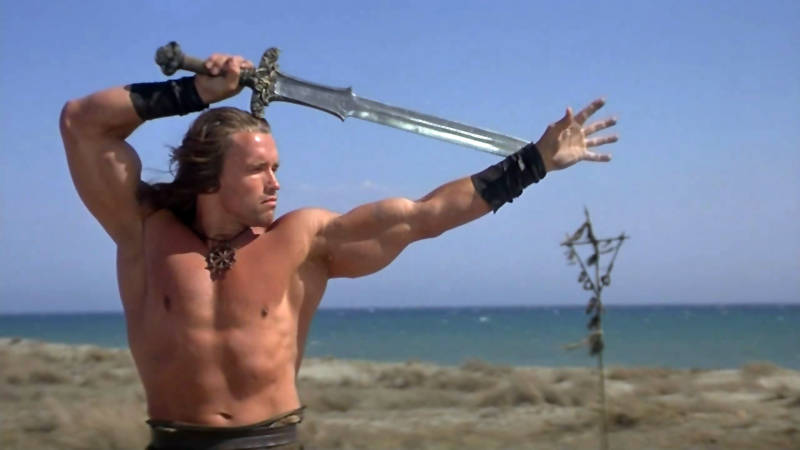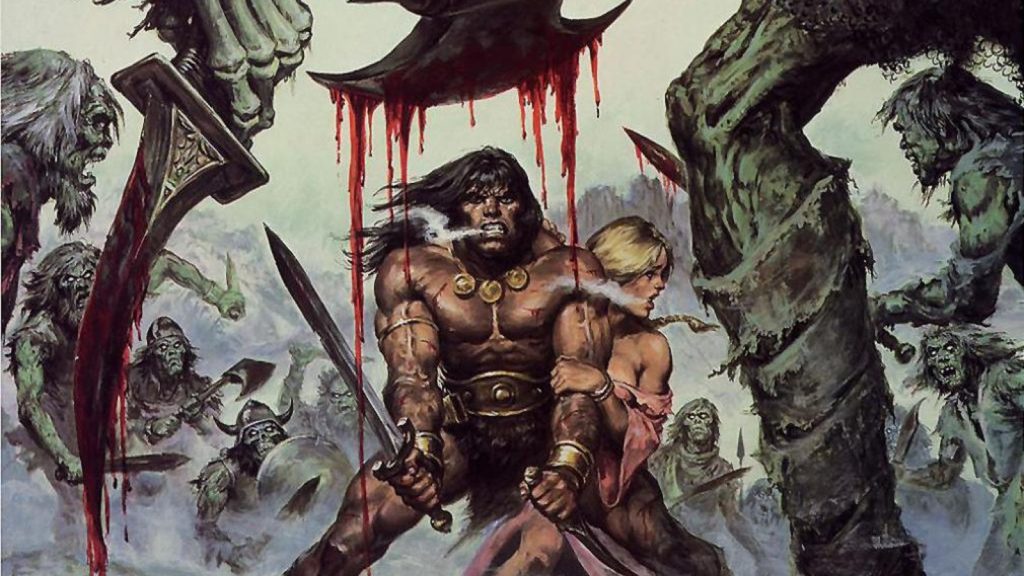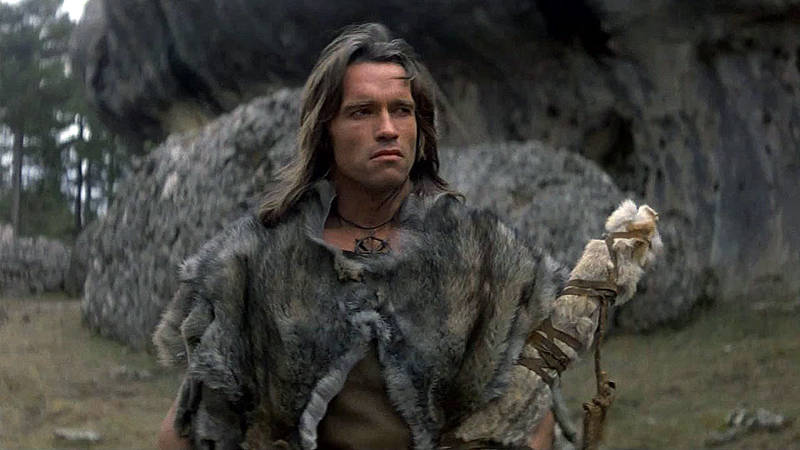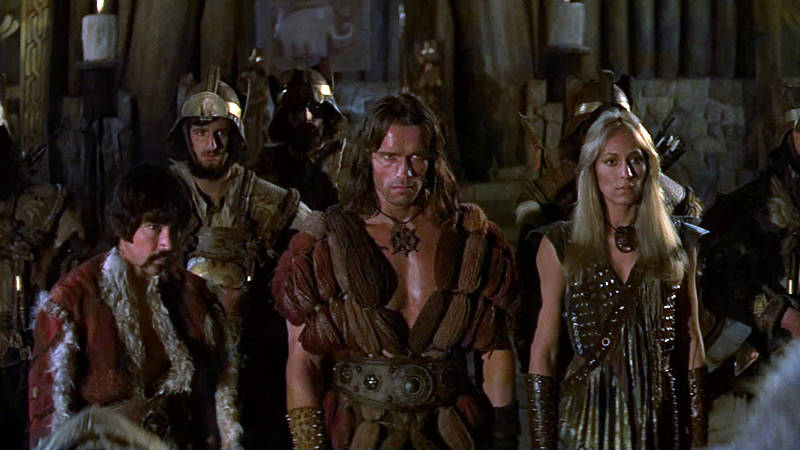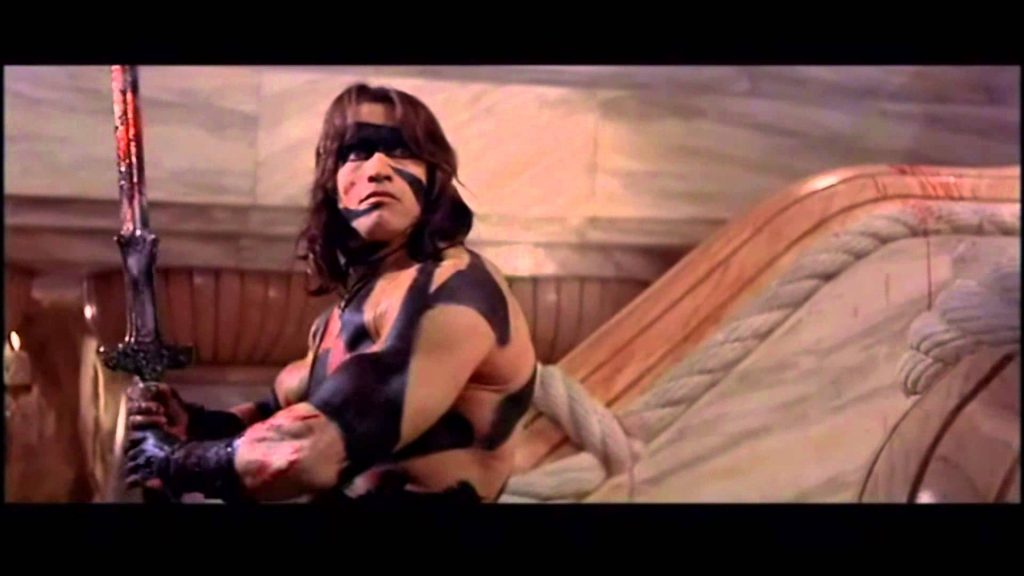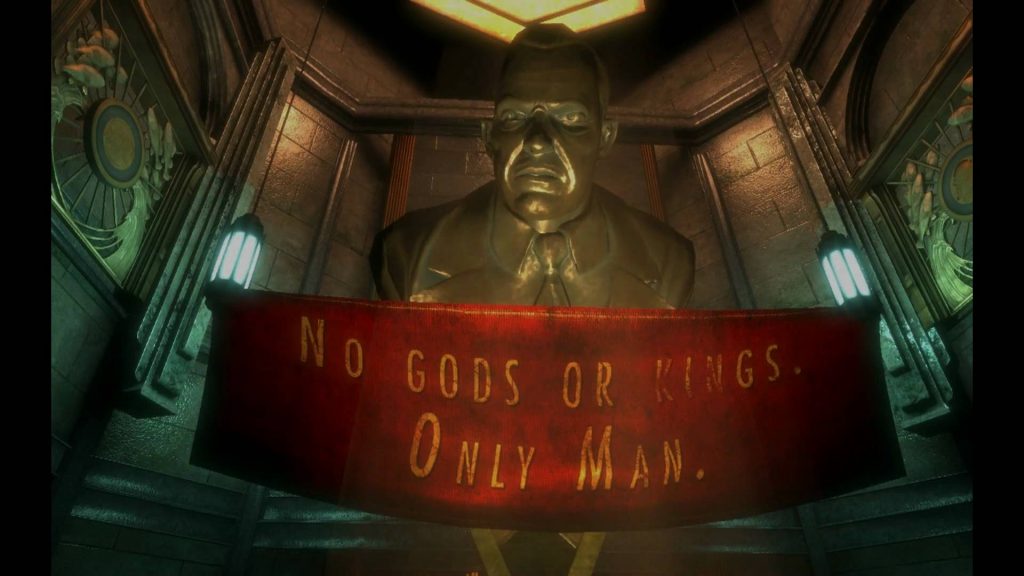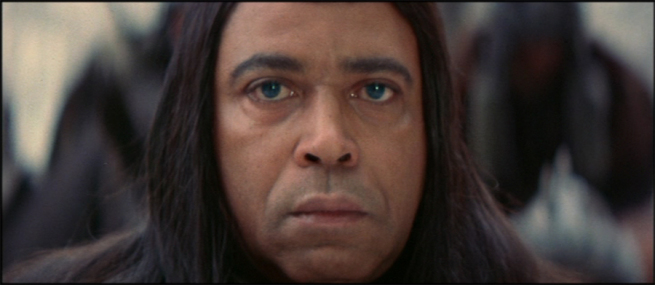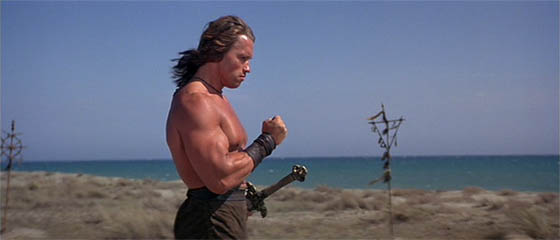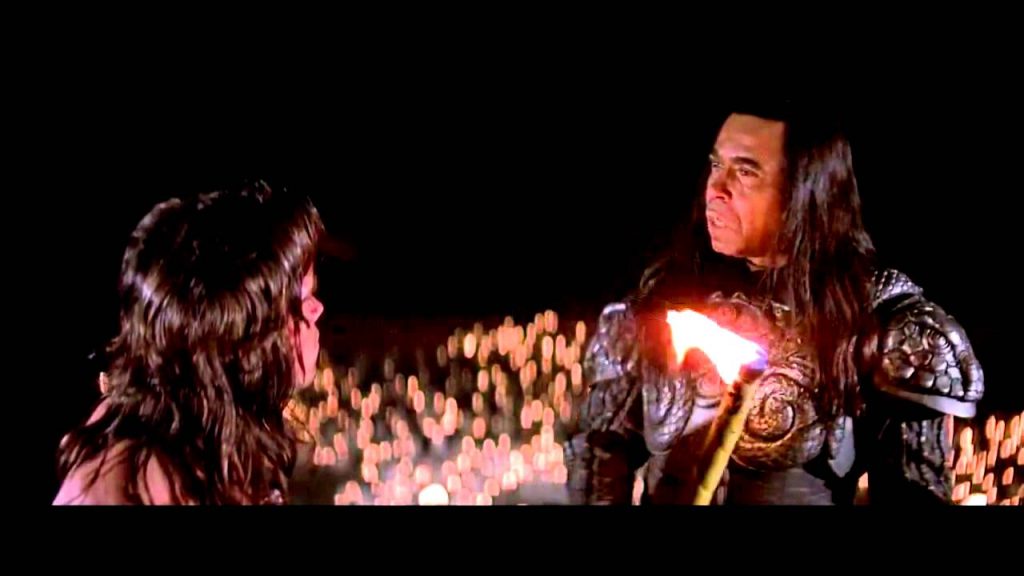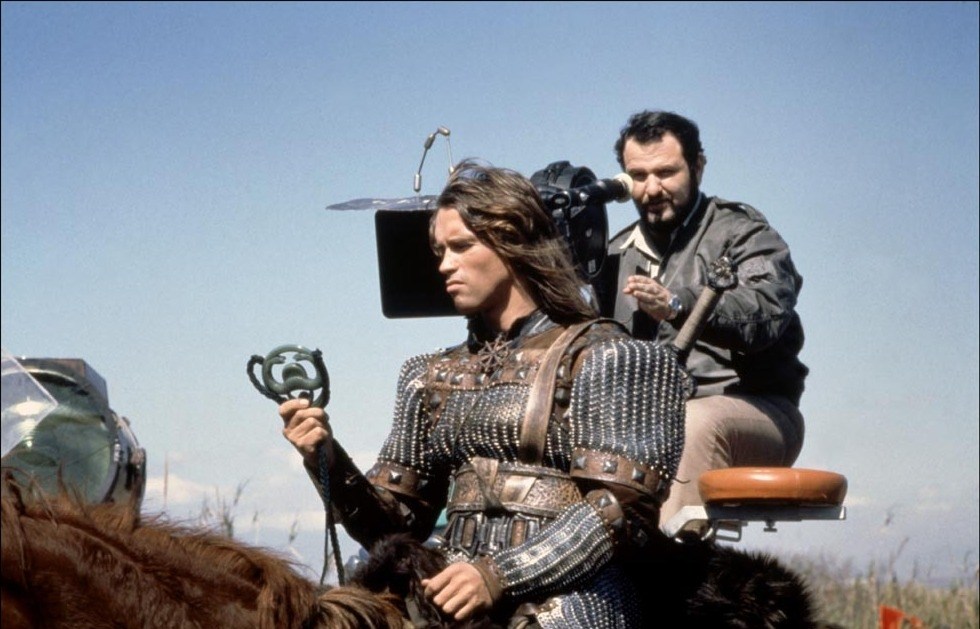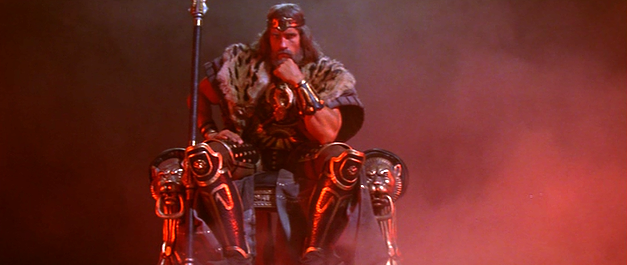WARNING! This post contains large amounts of spoilers, overthinking, and German philosophy.
What do you get if you take the screenwriter of Dirty Harry and Apocalypse Now, a former Mr. Universe, an Oscar-winning actor, a surfing champion, a professional dancer, a former pro-American football player, and a whole bunch of bodybuilders, and get them to make a sword and sorcery flick? The answer is Conan The Barbarian, the 1982 fantasy epic that launched the Hollywood career of action hero Arnold Schwarzenegger.
This year Conan The Barbarian celebrates its 35th anniversary. Based on the character and stories created by pulp fiction writer Robert E. Howard, Conan The Barbarian was the product of Scarface writer Oliver Stone and writer/director John Milius. It’s an unusual concept, a sword and sorcery film that contains very little of the lighthearted corniness and tongue-in-cheek writing that is consistent with the genre. Conan The Barbarian takes itself completely seriously, combining a stripped back script with grandiose sets and sweeping cinematography, not to mention a magnificently epic score composed by Basil Poledouris. It also polarised critics, with some praising the film for its action sequences and grand execution, and others condemning the film for its performances and depictions of violence. Many critics were also made extremely nervous by the movie’s Nietzschean themes, connecting them with Fascism.
If you haven’t seen the movie, Conan The Barbarian stars Arnold Schwarzenegger as the title role. It begins with Conan as a boy, watching his blacksmith Father, Corin, (William Smith) forging a master sword. His Father then tells Conan of their god, Crom, and The Riddle Of Steel, a philosophy and discipline that explains the importance of steel to Conan’s people, the Cimmerians. The village is then attacked and slaughtered by a band of warriors led by Thulsa Doom (James Earl Jones) Conan’s parents are killed, his father’s sword is taken, and he is bound into slavery. Chained and forced to push a huge grindstone, known as The Wheel Of Pain, Conan grows into an exceptionally strong and muscular young man. Eventually, he is released from the wheel and used as a pit fighter, after winning many bouts Conan’s Master takes him East to receive a proper education and formal training in combat from the war masters there. Conan wins so much prestige that his Master decides to release him, leaving Conan free to pursue vengeance upon Thulsa Doom for the murder of his people and discover the true meaning of The Riddle Of Steel. Along the way, Conan befriends Subotai (champion surfer Gerry Lopez) a thief archer and falls in love with Valeria (dancer Sandahl Bergman) a thief and sword fighter. Conan also enlists the help of Akiro (the late, great Mako Iwamatsu) The Wizard Of The Mounds, in order to defeat Thulsa Doom, who leads the snake-worshipping Cult Of Set and is rumoured to be a 1000-year-old sorcerer.
So what exactly does Conan The Barbarian have to do with Friedrich Nietzsche, 19th-century German philosopher? Well for starters, the movie begins with “That Which Does Not Kill Us Makes Us Stronger” a paraphrase from the Nietzsche essay ‘Twilight Of The Idols’ One of the fundamental concepts of filmmaking is that the audience sees nothing on the screen that is not there for a specific purpose. By beginning with a paraphrase of Nietzsche Milius immediately sets the tone and conveys the theme that runs consistently throughout the film, being made stronger by successfully overcoming adversity, even as the sword is made harder by tempering it with fire.
Swords and sword making are another overarching theme in Conan The Barbarian, in the Director Commentary (which is well worth a listen) Milius explains that he originally intended for the story of Conan to be a trilogy, with each part focusing on a different sword based theme. The first part was to be about the strength of the sword as it is forged, the second part was to have been about how the sword is wielded, and the third part was to be about the consequences of what the sword has wrought. As Schwarzenegger remarks in the commentary “This whole movie has to do with THAT, the sword. The building of the sword. Building with steel. And the character being like steel.” The swords themselves were considered so important to the movie that around $100 000 of the budget was spent on master sword maker Jody Samson forging multiple versions of the two principle blades of the film, the sword of Conan’s Father and the Atlantean sword that Conan carries for much of the movie.
Several other Nietzschean concepts are present throughout Conan The Barbarian. If you read or watch a lot of fantasy literature (as I do) you are probably familiar with the framework and characters of traditional Western heroic mythology. This includes the trope of the warrior who ‘plays by their own rules’ i.e creates and maintains their own personal code of morality or ethics. The philosophy of Nietzsche emphasises a focus on existentialism, the idea that our individual morality should not be defined by society, religion, or authority figures, but rather determined by ourselves as free agents. Nietzsche accentuated existence, freedom and choice of the individual to develop the self through acts of will.
Conan is taught by his father that he can trust no-one and nothing but the steel of the sword, then almost immediately after the village is slaughtered and the sword Conan had been told to trust completely is used to decapitate his Mother. Conan becomes a slave, then a gladiator, where he is forced to mindlessly kill whoever is put in front of him. However, the Conan of Milius is not a mindless brute. Though stoic and mostly silent in manner, he nonetheless cultivates a deeply contemplative mind. As soon as he is freed from slavery he chooses to pursue a personal vendetta of revenge against Thulsa Doom. Conan is a thief and a killer, choosing to disregard lawful societal conventions and live outside their moral framework. Yet he does not kill or steal indiscriminately, which implies that he has developed some kind of personal moral code. He also chooses to disregard the teachings of his Father and trust in Subotai and Valeria. A trust which ultimately pays off as Subotai saves Conan from the Tree Of Woe, and Valeria offers her life to the gods in exchange for his.
It’s worth noting that fans of the original Conan stories were unhappy with the changes Milius made to Conan’s personality and background. The Conan of Robert E. Howard is a much more roguish, good-natured and chivalrous character than the silent, brooding stoicism of Schwarzenegger. There were several reasons for this, Milius altered the background to suit the story he originally wanted to tell (which was about Vikings) and all three principal performers were cast on the basis of their physical resemblance to the characters and their athleticism, rather than their ability to convincingly convey dialogue. Working on the directional principle of ‘Show, Don’t Tell’ Milius altered the dialogue to suit the skills of the actors, and then spent months preparing them to convincingly bring the characters to life. All three principle performers underwent vigorous weapons and combat training by Kiyoshi Yamazaki, karate black belt and master swordsman (who even has a cameo as Conan’s weapons instructor) After hearing the delivery of Conan’s first line “Crush your enemies. See them driven before you, and to hear the lamentations of their women.” (a paraphrase of Ghengis Khan) the studio was concerned about Schwarzenegger’s thick Austrian accent. His lines of narration were given to Akiro and Milius gave Schwarzenegger intense speech training, making him practise each line around 40 times before filming. Gerry Lopez suffered some difficulty maintaining the quality of his voice, and so his lines were later redubbed by actor Sab Shimono.
The Milius interpretation of Conan fits in directly with Nietzsche’s concept of the übermensch, roughly translated as superman, which comes from Nietzsche’s book ‘Thus Spoke Zarathustra’. The übermensch is the superior man who overcomes the herd mentality of society and religion, and whose existence validates the human race. One of the primary principles of Nietzschean philosophy is that there is no God (“God is dead”) And that nothing that exists has any inherent meaning or sanctity. The übermensch must become his own god, developing morality and bestowing value as he sees fit without forcing his will on those around him. Conan represents the crowning glory of the human race, a specimen of physical perfection and master of survival who has cultivated a powerful mind and almost superhuman discipline. Though Conan has a god, Crom, he is the master of his own will and mostly chooses to ignore Crom, stating that “He doesn’t listen” When Akiro tells Conan that the gods are pleased with him, Conan’s immediate reaction is to assert that if the gods are not going to help then they should stay out of the way. Even Conan’s prayer before the Battle Of The Mounds is not so much an appeal for assistance, but a statement of personal power, and a declaration that if Crom will not assist him? Conan will succeed by himself. Nietzsche asserted that reliance on the self, rather than on gods or rulers, was one of the ways that mankind could renew itself and be reborn from the corruption and dissolution of traditional spiritual and societal systems. Conan The Barbarian is far from the only fictional setting to use these kinds of themes and imagery.
Other changes Milius made concern the villain, Thulsa Doom. Doom was created as a composite of two characters from the books, Thulsa Doom, skull-faced villain in the Kull Of Atlantis stories, and Thoth-Amon, a dark-skinned sorcerer and worshipper of a serpent deity known as Set. In Conan The Barbarian Thulsa Doom is of a pre-Atlantean race, and probably the last of his kind. He is a cult leader and sorcerer, with dark skin and hypnotic blue eyes. His powers include shape-shifting, using snakes as arrows, and mesmerising people with his eyes/voice. In Nietzschean terms, Doom is representative of the decadent corruption of the old world, the shifty and reptilian animal that sits directly in contrast to Conan’s physical and mental perfection.
Thulsa Doom does not fight, leaving the majority of the killing to warriors led by his lieutenants, Rexor (former Oakland Raiders player Ben Davidson) and Thorgrim (bodybuilder Sven-Ole Thorsen) Doom only emerges when it is safe to do so and the only kill he makes personally in Conan’s village is Conan’s Mother, decapitating her while she is mesmerised by his hypnotic eyes. Later he shape-shifts into a snake and flees the cannibalistic orgy of his throne room when he senses something amiss, and he runs after his lieutenants fall at the Battle Of The Mounds. Doom does not beat his opponents with valour or strength of will, but with cunning and the unskilled attributes of his reptilian nature. Valeria remarks that “His followers’ only purpose is to die in his service.” And it is fair to say that very little of what Doom says to his followers goes beyond philosophical platitudes and hollow rhetoric. The only recurring theme throughout his speeches is the idea of ’emptiness’, a concept which has its own rich philosophical background, but to him and his followers merely seems to be shorthand for abandoning personal responsibility and self-mastery in favour of blindly following Doom into the worst excesses of cannibalism, debauchery, and nihilism.
Thulsa Doom attempts to twist and corrupt Conan’s understanding of The Riddle Of Steel. Conan’s father, a blacksmith, interpreted the Riddle Of Steel as a literal aphorism concerning the strength and importance of the metal that to him is a reflection of the trappings of wealth. Rich men own great swords and strong armour, and their steel is what makes them great and powerful. Doom’s interpretation of the riddle is equally reflective of his nature. He focuses on the strength and power of the flesh that wields the steel, referencing the baser elements of the human animal. Conan is already looking for another answer to the riddle, after all, he has seen already that his Father’s steel was not enough to protect him or those he loved. Conan has also encountered King Osric (Max Von Sydow) who despite all his steel, wealth, and power, is unable to stop his own daughter from betraying him and becoming Doom’s consort. Doom tells Conan that the flesh controls the steel, therefore it has more power “Steel isn’t strong, boy. Flesh is stronger.” He illustrates his point by having one of his followers leap to her death from the rocks above them, before exclaiming “What is steel compared to the hand that wields it?” In Doom’s interpretation the power of the body is all that matters, therefore Conan should be indebted to him as Conan wouldn’t be as strong as he is without Doom’s intervention.
Doom’s answer may seem logical, a sword alone is useless without someone to use it, but it is an answer that Conan cannot accept. If the strength of the flesh is all that matters, then the bonds of trust and love he has forged with his companions are meaningless. After Subotai rescues Conan from his crucifixion on the Tree Of Woe, and Valeria delivers on her promise to give her own life to the gods so that Conan might live, Conan stands by The Mounds and contemplates what Doom told him. He clenches his fist, as Doom did, then draws his sword and commands the weapon in a series of poses and exercises, before returning to contemplating his hand.
As the story utilizes the concept of the three act structure, so does The Riddle Of Steel. The first part of the lesson was provided by Corin, Conan’s physical Father. The second part comes from Thulsa Doom, Conan’s spiritual Father. However, there is a third part, the lesson which begins just before The Battle Of The Mounds and is the focus of the third act of the movie. In a scene that was cut from the original but re-added to the DVD release, Conan and Subotai prepare for battle and Conan reflects on where his life has led him, and what could have been. He even offers Subotai the chance to leave, telling him that it is not too late to change things. It is clear that Conan fully expects to die in this fight, only hoping that he manages to take his revenge before he does so. After all, the whole of Thulsa Doom’s might is being thrown at him, and the only advantage he has is the terrain and the traps and pitfalls he and Subotai have set for Doom’s warriors.
However, it is not until the sword of Conan’s Father breaks during the fight with Rexor that Conan begins to understand the third lesson of The Riddle Of Steel, that while the flesh may power the steel it is the WILL that powers the flesh. In Nietzsche’s final, and heavily disputed (for reasons you’ll see later) work ‘The Will To Power‘ Nietzsche emphasizes that greatness can only be achieved not from reliance on gods or institutions, but from the self. The will is forged by our experiences, and our connections with others, they shape who we are and influence what drives us. The core of Nietzschean philosophy underlines that the driving force behind all our lives should be the will to self-actualise, to become what you are. As the Conan Wiki puts it “Flesh grows weak. Steel becomes brittle. But the will is indomitable.” The sword of Conan’s Father, a much younger blade than The Atlantean Sword that Conan wields, betrays its master and breaks (probably due to weaknesses in the metal and brittleness caused by being quenched in the snow during forging) The removal of Rexor and Thorgrim allows Conan to finally confront Thulsa Doom, as he exhorts his followers to commit mass suicide (Milius states in the commentary that this was inspired by Jim Jones) During their exchange it is only the strength of Conan’s will that allows him to resist Doom’s attempt to mesmerise him. Conan comes to himself, and strikes, decapitating Doom and ending his ability to influence Conan’s life. This is the last stage in fully understanding and claiming his personal power, and representative of the new world destroying the old world that created it. As Nietzsche puts it “The spirit now wills his own will, and he who has been lost to the world now conquers his own world.”
By now you must be thinking “What on Earth has any of this got to do with Fascism?” Well for a long time Nietzsche was referred to as ‘The Godfather Of Fascism’ This was due to the influence of his work on dictators Mussolini and Hitler. His ideas in ‘Thus Spoke Zarathustra‘ about the superior übermensch in particular, and his rejection of the concepts of God and traditional systems of morality, were interpreted as a confirmation of the superiority of the Aryan race. Sections from ‘The Will To Power’ were used to suggest that Nietzsche supported eugenics and the controlled breeding of a master race. Nazi officials, such as Alfred Baeumler, interpreted Nietzsche’s work as being vital to the formulation of Nazi doctrine “The German state of the future will not be a continuation of Bismarck’s creation, but will be created out of the spirit of Nietzsche and the spirit of the Great War” The Nazis of Germany and the Fascists of Italy considered themselves to be the übermensch, with the superiority of body and will that gave them the right to overcome all other, lesser races.
With this in mind, it’s hardly surprising that some critics and film academics were uncomfortable with the Nietzschean themes of Conan The Barbarian, and were concerned that it potentially glorified fascist ideology. Film critic Danny Peary wrote in his book ‘Guide For The Film Fanatic’ that the Nietzschean themes of Conan The Barbarian did not sit well with him, and that he was expecting something less serious and more high-spirited. Roger Ebert wrote that he was “disturbed” and that it was a “…rather unsettling image to see this Nordic superman confronting a black, and when Doom’s head was sliced off and contemptuously thrown down the flight of stairs by the muscular blond Conan, I found myself thinking that Leni Riefenstahl could have directed the scene and that Goebbels might have applauded it.” Ebert also suggests that Robert E. Howard’s Conan of the 1930s “…suggested in certain unstated ways the same sort of Nordic super-race myths that were being peddled in Germany.”
However Ebert’s point of view, while to some extent understandable, ignores several historical factors. For starters, Robert E. Howard greatly feared and mistrusted Fascism. In several letters to H.P Lovecraft (who was sympathetic to Fascist ideas) written over many years, Howard made his thoughts on the subject quite clear.
“I know it is the fad now to sneer at Democracy, but Democracy is not to blame for the troubles of the world. The men who are most to blame are the very men who now would “save” the country under the new name of Nazis, or Fascists.”
“You are right economics will have to be revolutionized entirely if the nation is to continue, and the choice seems to lie between fascism and communism – both of which I utterly detest.”
“You accuse me of “hating human development” because I mistrust Fascism. Well, there can’t be much tolerance [sic] about a system whose advocates denounce as “enemies of humanity” anyone who disagrees with them. According to that, you consider as “enemies of humanity” every man and woman in the world who is not a Fascist.”
The other aspect ignored by Ebert and other critics discomforted by Conan The Barbarian’s Nietzschean aspects is that, as it turned out, Nietzsche was the victim of a historical fit up. In the last years of Nietzsche’s life he began to succumb to mental illness, and his sister, Elisabeth Förster-Nietzsche, assumed control over his estate. Elisabeth was two years younger than her brother, an anti-Semite and German nationalist. She had married Bernhard Förster, a prominent Nazi, and she and her husband had attempted to establish a purely Aryan colony in Paraguay. After the colony failed and her husband committed suicide Elisabeth returned to Germany to care for her ailing brother. She discovered that Nietzsche’s work was just starting to be published and that his ideas were being discussed all over Europe. Elisabeth assumed the role of curator and began to edit her brother’s unfinished manuscripts, making it seem as if he was a right-wing nationalist and anti-semitic. ‘The Will To Power’ was compiled and published by Elisabeth, but only after she had heavily edited, and even fabricated, some of the content to align his ideas with her own. After Nietzsche’s death, Elisabeth opened The Nietzsche Archive, which Adolf Hitler visited in 1933.
But though Nazis and Fascists may have claimed Nietzsche as one of their own, he actually had very little time for nationalism and even less time for anti-Semitism. He refused to attend Elisabeth’s wedding because she was marrying a Nazi, and wrote several aphorisms condemning antisemitism, such as “Have nothing to do with a person who takes part in the dishonest race swindle” and “The anti-Semites cannot forgive the Jews for the fact that they have ‘spirit’.” These were removed from his work by Elisabeth before publication. One of the last things Nietzsche wrote before succumbing to his illness was “All anti-Semites should be shot” Nietzsche did not support Nazism or Fascism, in fact, his writings were intended to serve as a warning against such kinds of systems, ideologies that encouraged the abandonment of personal responsibility and morality in favour of mindless obedience to figures and institutions of authority.
Acknowledging and understanding context is important. To interpret Nietzsche, or Conan The Barbarian, as an endorsement of Fascism is to fundamentally misunderstand the point of the philosophy. The übermensch is not intended to demonstrate a human born superior through racial or genetic factors. It is designed to serve as an attainable goal, a state of being that we should all strive to obtain through physical and mental mastery of the self. Conan is not born special, his experiences and how he chooses to respond to them make him so. In a world of brutality and savagery, Conan develops his own principles, and the will to hold to them.
Ultimately, Conan The Barbarian is a movie that reflects the time. Ronald Reagan, republican, former actor, and celebrity, was president of the US, advocating personal merit and encouraging a focus on individual enterprise rather than any kind of group identity (any of that sound familiar?) Looking back from a time of greater political correctness it’s kind of amazing that a movie like Conan The Barbarian exists, a movie that manages to communicate such deep philosophical ideas while people wearing sandals scowl and whack each other with various bits of metal. The studio certainly felt that Conan The Barbarian would have made more money if it had been a bit less Nietzschean, and a lot less violent. The sequel, Conan The Destroyer, was much less bloody (recut to ensure a PG rating) and a lot more comedic. Schwarzenegger returned for the sequel, and rather than focusing on any deep and meaningful theme Conan The Destroyer mainly seemed to involve him saying a lot more, and wearing a lot less. I can’t help but wonder if Milius had been allowed to finish his vision, where would he have taken things? How would the free and triumphant Conan have become the weary and troubled-looking king hinted at the beginning and end narration? Would the consequences of the sword see the übermensch become absorbed by the very trappings and systems he initially rejected? Sadly this is a story that likely will never be told, and as a fan of Conan The Barbarian, I cannot help but be sad.

